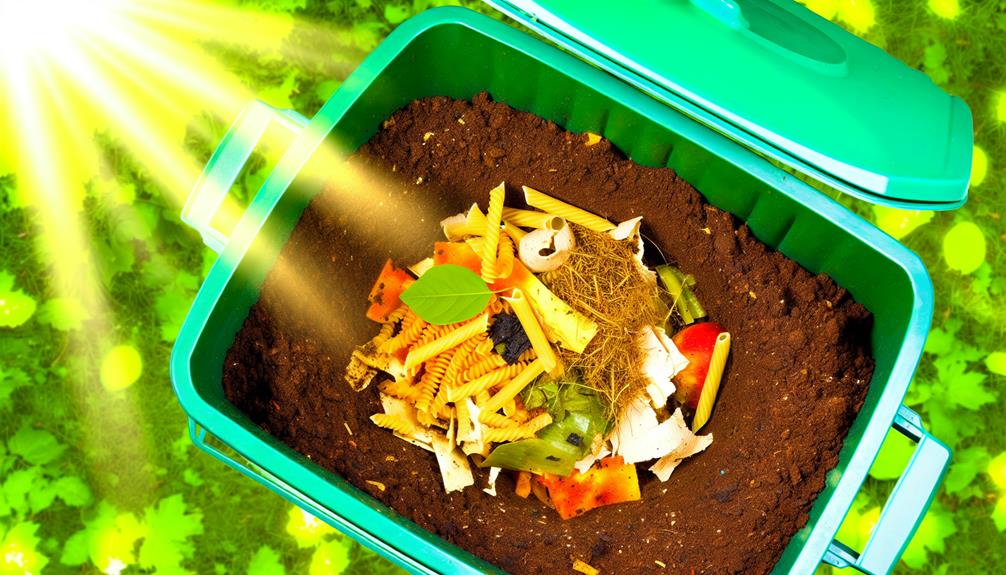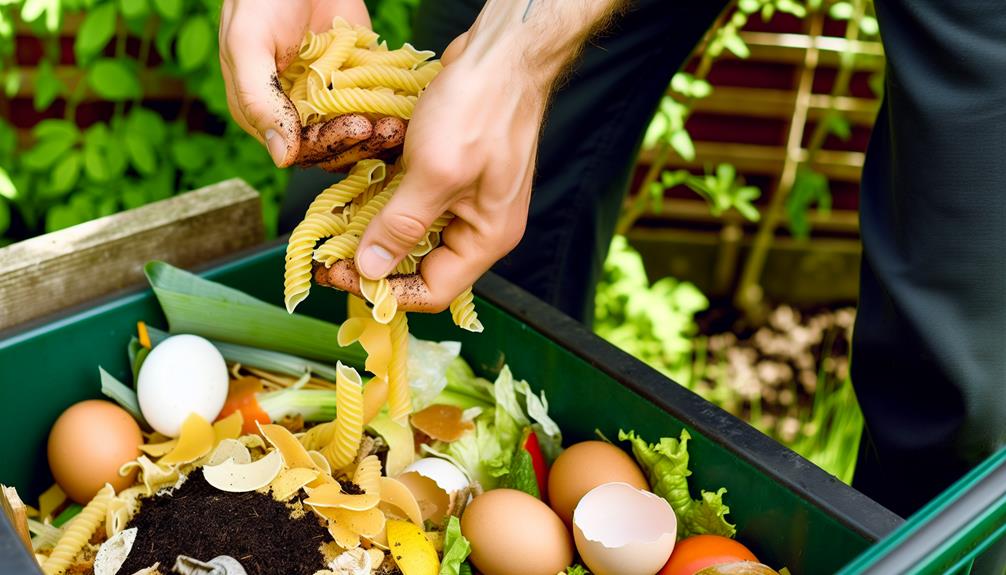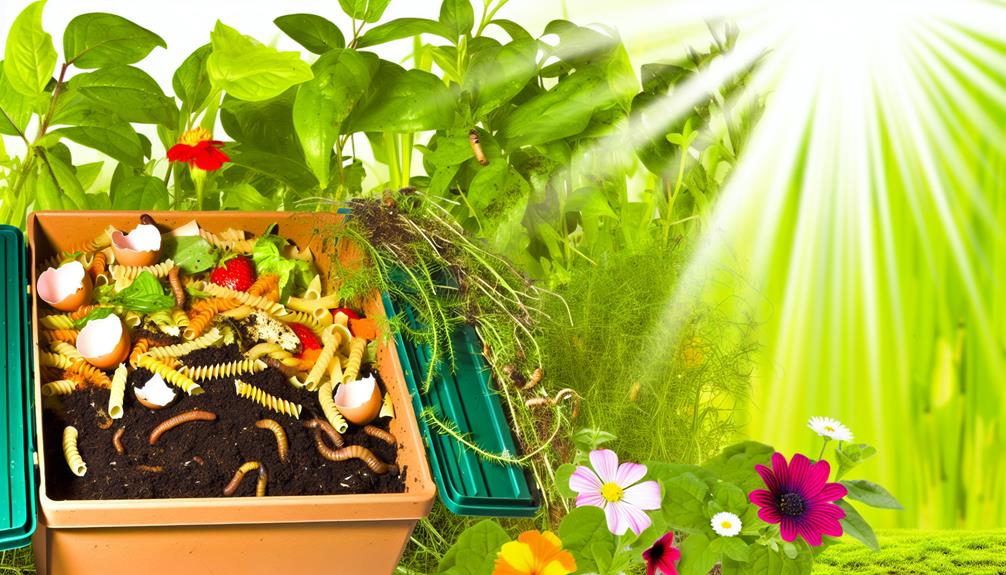

You can compost uncooked pasta to enrich your soil and reduce household waste. Break the pasta into smaller pieces for faster decomposition and mix it well with other organic materials. Guarantee you balance the high carbon content of the pasta with nitrogen-rich materials like kitchen scraps or grass clippings.
Watch the moisture levels carefully, as excess moisture can create anaerobic conditions and attract pests. Bury the pasta well within the compost pile to prevent any issues. By maintaining these practices, you’ll contribute to a healthy, balanced compost pile. There’s more to learn about maintaining a successful composting system.
Composting uncooked pasta enriches your soil with essential nutrients, promoting healthier plant growth. By adding pasta to your compost pile, you’re contributing to soil enrichment, which is vital for cultivating a thriving garden. Pasta, being rich in carbohydrates, breaks down into simpler organic compounds that plants can readily absorb. This process not only enhances soil structure but also boosts microbial activity, fostering a more fertile environment for your plants.
Moreover, incorporating uncooked pasta into your compost helps with waste reduction. Instead of tossing out old or expired pasta, you can repurpose it as a valuable resource for your garden. This practice not only minimizes household waste but also supports a more sustainable lifestyle. It’s a small yet impactful step towards reducing the amount of organic waste that ends up in landfills.
To begin, simply break the pasta into smaller pieces to speed up decomposition. Mix it well with other compost materials like vegetable scraps, coffee grounds, and yard waste. By doing so, you create a balanced compost pile that decomposes efficiently. Remember to maintain proper moisture and aeration levels to ensure ideal composting conditions.
Also Read: Can You Compost Bones?
When adding uncooked pasta to your compost pile, you should keep an eye on potential issues that could hinder the composting process. One of the primary concerns is pest attraction. Uncooked pasta can attract unwanted pests such as rodents and insects, which can disrupt your composting efforts and create additional problems. To minimize this risk, make sure to bury the pasta well within the compost pile, rather than leaving it exposed on top.
Another aspect to keep in mind is moisture content. Uncooked pasta can absorb a significant amount of water, potentially disrupting the balanced moisture levels necessary for effective composting. Too much moisture can lead to anaerobic conditions, producing unpleasant odors and slowing down the decomposition process. To prevent this, monitor the moisture levels in your compost pile regularly. You might need to add dry materials like leaves, straw, or shredded paper to counterbalance the moisture absorbed by the pasta.
To effectively add uncooked pasta to your compost, start by breaking it into smaller pieces to speed up the decomposition process. This not only helps the pasta break down quicker but also guarantees it integrates well with other compost materials. Once you’ve broken the pasta, mix it thoroughly with other organic materials in your compost pile.

Remember, uncooked pasta is a ‘brown’ material, meaning it has a high carbon content. To achieve the best composting results, balance it with ‘green’ materials, which are high in nitrogen. Think of vegetable scraps, coffee grounds, or grass clippings as good companions for your pasta.
Moisture level is key when adding pasta to your compost. If your compost pile is too dry, the pasta won’t decompose efficiently. Add water to maintain a damp consistency similar to a wrung-out sponge. On the flip side, if your pile is too wet, the pasta might clump together and create unpleasant odors.
Incorporate your pasta thoughtfully into your compost, and you’ll contribute to a healthy, balanced pile. By managing carbon content and moisture level, you’ll be well on your way to producing rich, fertile compost for your garden.
Also Read: Can You Compost Body Wash?
Balancing your compost pile involves maintaining the right mix of ‘green’ and ‘brown’ materials to guarantee efficient decomposition and nutrient-rich compost. The key to this balance is understanding the carbon ratio and moisture levels in your pile. ‘Green’ materials like kitchen scraps and grass clippings provide nitrogen, while ‘brown’ materials like leaves and cardboard offer carbon. Aim for a carbon ratio of about 30:1 (carbon to nitrogen) for best results.
You’ll need to regularly monitor and adjust the moisture levels in your compost pile. It should feel like a damp sponge—moist but not waterlogged. Too much moisture can cause odors and slow decomposition, while too little can halt the process altogether. Turning your pile every few weeks helps aerate it and distribute moisture evenly.
Don’t worry if you feel a bit overwhelmed at first; you’re part of a community of eco-conscious individuals working towards the same goal. By paying attention to the carbon ratio and moisture levels, you ensure a healthy composting process.
Also Read: Can You Compost Blood?
Successful composting hinges on a few practical tips that can make or break your composting experience. To begin with, using the right composting tools is essential. A good pitchfork, a compost thermometer, and a compost aerator can help you manage and monitor your compost pile efficiently. These tools make it easier to turn the pile, guaranteeing proper aeration, which is vital for decomposition.

Next, keep an eye on moisture levels. Your compost pile should be as damp as a wrung-out sponge. Too much moisture can lead to a smelly, anaerobic pile, while too little moisture slows down the decomposition process. Regularly check the moisture and add water or dry materials like leaves and newspaper to balance it out.
Additionally, balance green and brown materials. Greens, such as vegetable scraps and grass clippings, provide nitrogen, whereas browns, like dried leaves and cardboard, supply carbon. Aim for a ratio of roughly three parts brown to one part green.
Lastly, location matters. Place your compost bin in a well-drained, convenient spot in your yard. This way, you’ll be more likely to maintain it regularly. Following these tips ensures your composting journey is smooth and productive.
Yes, you can compost cooked pasta! It adds nutrient content and helps maintain moisture balance in your compost. Just mix it well with other materials, and you’ll contribute to a thriving, healthy compost community.
You’re wondering, “how long does pasta take to decompose in compost?” Pasta’s decomposition rate varies, but it generally takes a few months for organic breakdown. Join our community of composters to share tips and experiences!
Yes, pasta can attract pests in the compost pile. To manage pests, use effective compost barriers. By doing so, you’re ensuring a healthy compost environment, fostering community spirit, and contributing to sustainable living practices.
Yes, you can compost gluten-free pasta! Its nutrient content benefits the compost, just like regular pasta. Embrace pasta alternatives in your compost to support a diverse ecosystem and feel connected to sustainable practices.
You should break pasta into smaller pieces before composting. Doing so helps maintain moisture balance and improves compost aeration. By following this step, you’re ensuring a more efficient composting process and contributing to a thriving garden community.
To sum up, you can compost uncooked pasta effectively by following a few simple steps.
Break it into smaller pieces and mix it with a variety of other compost materials. Make sure your compost pile is balanced with both green and brown materials to maintain proper decomposition.
Regularly turning the pile helps aerate and speed up the process. By managing these elements, you’ll create nutrient-rich compost for your garden while reducing kitchen waste.
